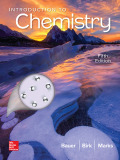
Concept explainers
(a)
Interpretation:
Whether the name is of the given compound or not. The modification of the given molecule that represents each compound is to be determined.
(b)
Interpretation:
Whether the name is of the given compound or not. The modification of the given molecule that represents each compound is to be determined.
(c)
Interpretation:
Whether the name is of the given compound or not. The modification of the given molecule that represents each compound is to be determined.
(d)
Interpretation:
Whether the name is of the given compound or not. The modification of the given molecule that represents each compound is to be determined.
(e)
Interpretation:
Whether the name is of the given compound or not. The modification of the given molecule that represents each compound is to be determined.
Want to see the full answer?
Check out a sample textbook solution
Chapter 16 Solutions
EBK INTRODUCTION TO CHEMISTRY
- 1. The following molecule contains the functional groups A. secondary amine, secondary alcohol, ketone, carboxylic ester B. amide, primary alcohol, aldehyde, carboxylic acid C. secondary amine, two secondary alcohols, and two ketones D. primary amine, secondary alcohol, ketone, and carboxylic acid The following molecule contains the functional groups 2. A. primary alcohol and primary amine C. secondary alcohol and primary amine 3. A. alkene and secondary alcohol C. ketone and seconary alcohol The following molecule contains the functional groups B. ether and ketone D. ether and alkene 4. The following molecule A. primary amine and ketone C. secondary amine and alkyne NH₂ contains the functional groups B. secondary amine and alkene D. secondary amine and ketone ОН OH B. secondary alcohol and secondary amine D. primary alcohol and secondary amine NH₂ OHarrow_forwardWhat does a functional group do in an organic molecule?arrow_forwardConsider the below organic molecule. Which of the following functional groups is not present in the molecule? OH HO- ester alcohol ether O ketone O carboxylic acidarrow_forward
 Introductory Chemistry: A FoundationChemistryISBN:9781337399425Author:Steven S. Zumdahl, Donald J. DeCostePublisher:Cengage Learning
Introductory Chemistry: A FoundationChemistryISBN:9781337399425Author:Steven S. Zumdahl, Donald J. DeCostePublisher:Cengage Learning World of Chemistry, 3rd editionChemistryISBN:9781133109655Author:Steven S. Zumdahl, Susan L. Zumdahl, Donald J. DeCostePublisher:Brooks / Cole / Cengage LearningChemistry: Matter and ChangeChemistryISBN:9780078746376Author:Dinah Zike, Laurel Dingrando, Nicholas Hainen, Cheryl WistromPublisher:Glencoe/McGraw-Hill School Pub Co
World of Chemistry, 3rd editionChemistryISBN:9781133109655Author:Steven S. Zumdahl, Susan L. Zumdahl, Donald J. DeCostePublisher:Brooks / Cole / Cengage LearningChemistry: Matter and ChangeChemistryISBN:9780078746376Author:Dinah Zike, Laurel Dingrando, Nicholas Hainen, Cheryl WistromPublisher:Glencoe/McGraw-Hill School Pub Co Living By Chemistry: First Edition TextbookChemistryISBN:9781559539418Author:Angelica StacyPublisher:MAC HIGHER
Living By Chemistry: First Edition TextbookChemistryISBN:9781559539418Author:Angelica StacyPublisher:MAC HIGHER
 Introductory Chemistry: An Active Learning Approa...ChemistryISBN:9781305079250Author:Mark S. Cracolice, Ed PetersPublisher:Cengage Learning
Introductory Chemistry: An Active Learning Approa...ChemistryISBN:9781305079250Author:Mark S. Cracolice, Ed PetersPublisher:Cengage Learning





